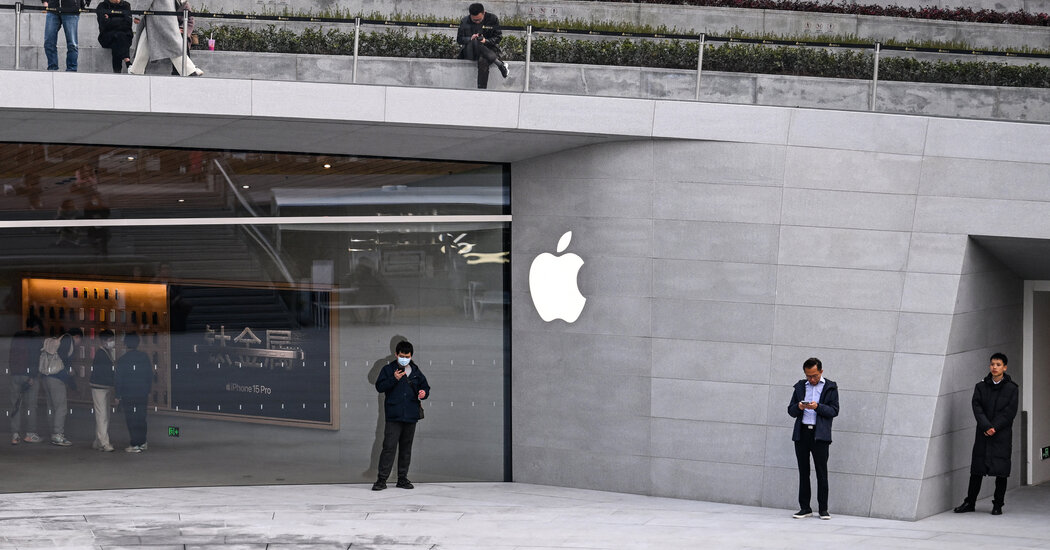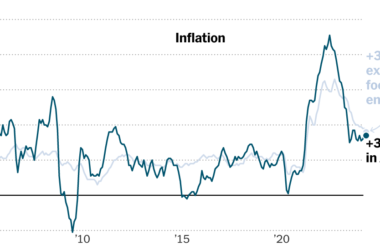Apple said it pulled the Meta-owned apps WhatsApp and Threads from its app store in China on Friday on government orders, potentially escalating the war over technology between the United States and China
The iPhone maker said that China’s internet regulator, the Cyberspace Administration, ordered the removal of WhatsApp and Threads from its app store because of national security concerns. Apple said that it complied because “we are obligated to follow the laws in the countries where we operate, even when we disagree.”
A Meta spokesman directed requests for comment to Apple. The Wall Street Journal earlier reported Apple’s removal of the apps.
A person briefed on the situation said the Chinese government had found content on WhatsApp and Threads about China’s president, Xi Jinping, that was inflammatory and violated the country’s cybersecurity laws. The specifics of what was in the content was unclear, the person said.
Several other global messaging apps had also been removed from Apple’s App Store in China on Friday, including Signal, which is based in the United States, and Telegram, which is based in Dubai, according to Appfigures, a market research firm that analyzes the digital economy. Signal didn’t immediately have a comment and Telegram didn’t respond to a request for comment.
The actions thrust Apple and Meta into an intensifying tussle over technology between the United States and China. In the United States, the House of Representatives was preparing to vote on a bill as soon as this weekend that would force the Chinese internet company ByteDance to sell its popular video app TikTok or have it be banned in the United States. U.S. lawmakers have said TikTok poses a national security threat because of its ties to China. Chinese officials have condemned the push to force a TikTok sale.
The White House has also recently worked to restrict Beijing’s access to advanced technologies that could be used in war, as well as extend restrictions to American dollars that are used to finance the development of such technologies within Chinese borders. Beijing has responded by banning memory chips from the U.S. chipmaker Micron and moving to curb other American chip companies’ sales.
China has long blocked American websites including Facebook and Instagram by using an elaborate system called the Great Firewall. While WhatsApp, one of the world’s most popular messaging services, and Threads, an X-like app for digital conversation, were permitted in app stores, they were not used widely in China. The apps were dwarfed by Chinese ones such as WeChat, which is owned by the Chinese internet company Tencent.
Still, Chinese users had been able to download WhatsApp and use it with the assistance of a virtual private network, or VPN, which are used to set up secure web connections and view prohibited content inside China.
WhatsApp had been downloaded 15 million times on iPhones in China since 2017, while Threads had been downloaded 470,000 times, according to Appfigures.
Apple has been more vulnerable than most companies to the rising tensions between the United States and China. It became one of the world’s most valuable public companies by tapping China’s vast work force and manufacturing muscle to build its iPhones and then selling the devices to the country’s growing middle class. China now accounts for about a fifth of Apple’s annual sales, more than $68 billion last year.
For years, Apple has bowed to Beijing’s demands that it block an array of apps, including newspapers, VPNs and encrypted messaging services. It also built a data center in the country to house Chinese citizens’ iCloud information, which includes personal contacts, photos and email.
As the relationship between the United States and China deteriorated, Apple began diversifying its supply chain and has started assembling iPhones, AirPods and Apple Watches in India and Vietnam.
Tim Cook, Apple’s chief executive, has been in Asia this week, where he has visited suppliers in Vietnam and spoke with Indonesia’s president about building a manufacturing plant there.
For Meta, any fallout will likely be less direct, given that many of its apps were already banned in China. Still, Meta makes money from Chinese companies like Temu and Shein, which pay to place advertising inside Instagram and Facebook.
Meta and Apple have long had an uneasy corporate relationship. Apple has introduced greater restrictions on the types of tracking that companies could do across its devices, severely curtailing Meta’s ability to gain insights into user behavior for its digital advertising business. Mark Zuckerberg, Meta’s chief executive, has publicly railed against what he feels are Apple’s overly restrictive privacy guidelines.
In the United States, the moves against TikTok have gained momentum in recent days, with House Speaker Mike Johnson packaging a measure to force ByteDance to sell the app with other bills on foreign aid for Ukraine, Israel and Taiwan.
House lawmakers are expected to vote Saturday on the package of legislation. If the package passes, the measures will be sent as a single bill to the Senate, which could vote soon after. President Biden has said he would sign TikTok legislation into law if it reaches his desk.




